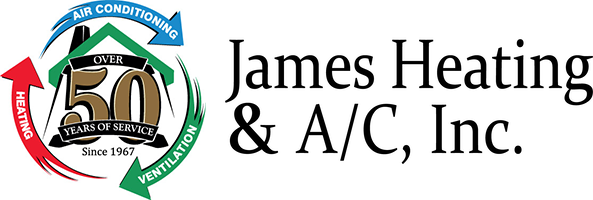
We can all benefit from saving money from time to time. One of the simplest ways to do so is by identifying energy inefficiencies in your home. Upgrading your HVAC equipment or adding a smart thermostat, for example, offers more control over your heating and cooling system, resulting in a more energy-efficient home and more affordable monthly energy bills.
Keep reading to learn about 4 ways you can make energy-efficient home improvements.
1. Install Smart Home Products Like a Smart Thermostat
If you still use an older thermostat and adjust it manually, consider taking a step toward the future by installing a smart, or Wi-Fi, thermostat – which includes numerous features to improve your home's energy efficiency.
The functionality homeowners appreciate the most is having the capability to control their smart thermostats from anywhere they want through their smartphone or other smart device. For instance, when you forget to change your thermostat before taking a vacation, you can easily use your smartphone and make the necessary adjustment.
Just like a programmable thermostat, a smart thermostat permits you to schedule your home’s temperature according to the time of day and day of the week so you’re not cooling or heating an empty house. Smart thermostats also feature the ability to understand your temperature preferences over time and automatically make energy-efficient corrections. They can even provide monthly energy reports that illustrate how much energy you are using and when so you can make changes to save money.
If you’re curious about how to get a free smart thermostat, talk to your utility company to see if there are any discounts or free smart thermostats offered.
2. HVAC Tune Ups
Regrettably, many homeowners often forget about having their heating and cooling systems maintained. While this might not seem like a problem, a lack of maintenance can produce a number of issues, including inefficiency, breakdowns, and a shorter system lifespan.
When performing an HVAC maintenance service, a heating and cooling technician is going to evaluate your HVAC system, clean key components, and pinpoint minor flaws before they lead to bigger, more expensive repair issues. Maintenance can keep HVAC systems functioning at optimal condition, which means less energy is needed to heat and cool your home. This could also help with your energy bills, increase the lifespan of HVAC equipment, and contribute to fewer repairs.
We suggest two HVAC tune ups each year – one in the spring before summer and again during the fall before the arrival of winter weather.
3. Upgrading Your Worn-Down, Inefficient HVAC Equipment
Unfortunately, like every appliance, HVAC systems have a shelf life and eventually need to be replaced. Modern heaters and cooling equipment is much more effective than equipment manufactured just over a decade ago. Fortunately, quality HVAC companies like James Heating & A/C, Inc can handle professional services such as furnace installation in Lexington.
Well-maintained furnaces and air conditioners can last approximately 15-20 years. If your system is within that span, it is often be a good idea to replace them early to prevent premature equipment failures that can leave you cold and uncomfortable on a cold winter night. If your HVAC system is approaching 15 years old and has a problem that needs an expensive repair, it’s definitely time to replace the unit. As reported by the U.S. Department of Energy, installing a new HVAC system can save you approximately 20-40% on your monthly energy bills, so you’ll recoup some of the costs of buying a new system.
A professional comfort technician can help you determine the most energy efficient HVAC system for your needs. In general, try to find HVAC systems that are Energy Star certified, which means the equipment fulfills firm guidelines made by the U.S. Environmental Protection Agency. LENNOX HVAC systems are often some of the most efficient systems available, featuring both high AFUE and SEER ratings. AFUE is used for heating systems and illustrates how well they convert fuel to heat. SEER, on the other hand, is used to measure the energy efficiency of air conditioning systems.
Contact a reputable HVAC provider like James Heating & A/C, Inc for air conditioning installation in Lexington.
4. Look for High Efficiency Air Filters
If you’re looking for new HVAC filters, remember that not all air filters are the same. Specific air filters are far more successful than others, contributing to lower energy bills and a cleaner home environment.
The performance of HVAC air filters is illustrated by their Minimum Efficiency Reporting Value, or MERV rating. The MERV scale ranges between 1-20; the higher the number, the more efficient the filters are. It’s worthwhile to note, however, that high-efficiency air filters can in fact impede airflow too much depending on the type of HVAC system you installed. It’s worthwhile to read the owner’s manual before getting a filter to find the ideal model for your system.

